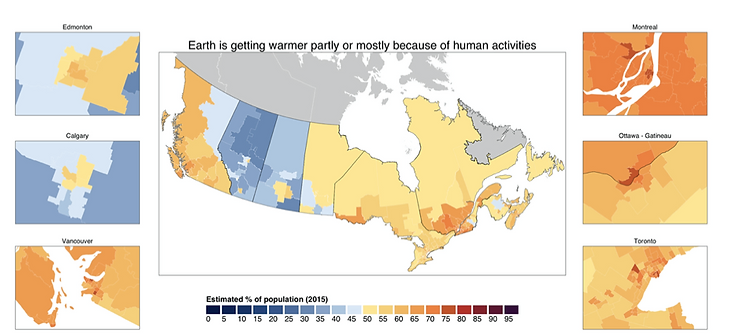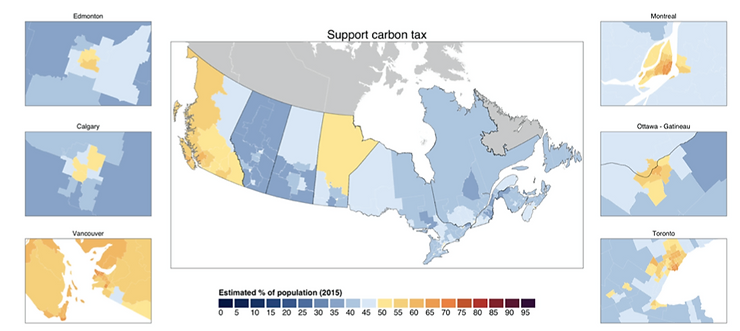The Relationship Between Your Riding and Climate Change Opinions: A Research Article Review
Author
Lauren Wintraub

In this day and age, all countries around the world face an imminent, human-made global warming crisis, and Canada is no different. In fact, Canada is particularly at risk of negative effects from climate change due to the quickly melting arctic, recent wildfires, sudden appearances of invasive species, more frequent heatwaves, and flooding (1). In order to reverse the effects of global warming, countries must develop national policies that work to support energy production methods that produce little to no greenhouse gases. An issue that has come up in recent years is that policies need the support of the public to get passed – but there are many different beliefs that exist in Canada when it comes to climate change. Due to the fact that fossil fuel extraction from Alberta and other provinces contributes significantly to Canada’s economy, and that provinces have the ability to, in many ways, make their own decisions apart from other provinces, united social support for climate change policies has often been tough. In the past, researchers have found that of Canadians, 87% agree that climate change is occurring but only 47% believe that that the change is happening mostly because of humans (2). For the first time, a study published in 2016 set out to develop a map that estimates Canadians’ climate change opinions based on which riding they live in (3). This study was created in order to better understand the ideological differences that exist across the country when it comes to climate change.
The model used data collected from the annual Canadian Surveys on Energy and Environment of 2011-2015 in addition to the geographic location of respondents (3). Firstly, the model estimated the relationship between where individuals lived, certain personal characteristics ( including age, education, language, religion, political orientation, whether they drive to work, and whether they are employed by companies that are major producers of greenhouse gases), and their reported opinions on climate change. Then the study considered the distribution of estimated opinions of groups of individuals with similar demographics and geographic locations in certain areas of interest across the country. Together, all this data was used to estimate the opinion of groups of people living in different political geographies (i.e. ridings). The results were collected for all provinces excluding Labrador (3).
Based on the estimation model, the authors show that a majority of Canadians believe that climate change is happening now, even though there are noticeable differences in different regions of the country. The study estimated that in 97% of all ridings in Canada, more than half the constituents believe in climate change. Furthermore, British Columbia, Nova Scotia, Quebec and most urban areas had the highest belief percentages in climate change, while the Prairies and rural areas, in general, had lower belief percentages (3).
Interestingly, there was more variation in estimations regarding Canadians beliefs of the causes of climate change. The study estimated that people who lived in rural areas, especially Alberta, and/or worked for greenhouse gas industries had the lowest likelihood of believing that climate change is human-caused, and vice versa (urbanites were more inclined to blame humans for global warming). Put differently, people were predicted to believe less in the fact that climate change is caused by humans if their livelihood is based on it (Figure 1) (3). Further, based on the model, every district was found to support the carbon cap-and-trade system (i.e. to put a limit on the amount of carbon pollution a company can produce); however, there was less consensus on a national carbon tax (taxing all Canadians based on the amount of carbon emissions they produce) (3). Specifically, there are many rural ridings across Canada that were projected to have a minority in regards to supporting the carbon tax (Figure 2).
Overall, this unique and helpful study has shed light on a map of Canada that helps us better understand the opinions held by Canadians in different political geographies. This study can be used by Canadians and policymakers alike to better understand the country we live in and create positive change in Canada’s action plans.

Figure 1. Distribution of belief that climate change is caused by humans (from Mildenberger et al., 2016).

Figure 2. Distribution of support for the carbon tax. (from Mildenberger et al., 2016).
References
- Bush E & Lemmen DS, ed. Canada’s Changing Climate Report. Government of Canada, 2019, Ottawa, ON. 444 p.
- McCright AM & Dunlap RE. Cool dudes: The denial of climate change among conservative white males in the United States. Global Environmental Change. 2011, 21(4): 1163-1172. DOI: 10.1016/j.gloenvcha.2011.06.003
- Mildenberger M, Howe P, Lachapelle E, Stokes L, Marlon J, Gravelle T. The Distribution of Climate Change Public Opinion in Canada. Plos One. 2016, 11. DOI: 10.1371/journal.pone.0159774.



